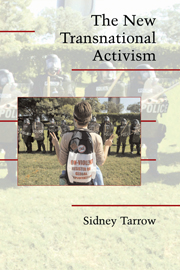Book contents
- Frontmatter
- Contents
- List of Tables
- List of Figures
- Preface and Acknowledgments
- The New Transnational Activism
- 1 INTRODUCTION
- Part One Structure, Process, and Actors
- Part Two The Global in the Local
- Part Three Transitional Processes
- Part Four The Local in the Global
- 8 EXTERNALIZING CONTENTION
- 9 BUILDING TRANSNATIONAL COALITIONS
- Part Five Transnational Impacts at Home and Abroad
- Glossary
- Sources
- Index
9 - BUILDING TRANSNATIONAL COALITIONS
Published online by Cambridge University Press: 05 September 2012
- Frontmatter
- Contents
- List of Tables
- List of Figures
- Preface and Acknowledgments
- The New Transnational Activism
- 1 INTRODUCTION
- Part One Structure, Process, and Actors
- Part Two The Global in the Local
- Part Three Transitional Processes
- Part Four The Local in the Global
- 8 EXTERNALIZING CONTENTION
- 9 BUILDING TRANSNATIONAL COALITIONS
- Part Five Transnational Impacts at Home and Abroad
- Glossary
- Sources
- Index
Summary
Refusing the Trojan Pig
Early in 1999, write Arunas Juska and Bob Edwards (2004: 187), Tom Garrett of the Animal Welfare Institute (AWI) noticed two seemingly unrelated items in the press: “First, Polish farmers were revolting against low prices with a sustained nonviolent direct action campaign that had spread to Warsaw. Second, the world's largest pork products producer, Smithfield Foods, had just announced with much fanfare, its plans to purchase the Polish pork conglomerate Animex and bring its American-style success story to Poland.” What resulted when Garrett put the two stories together was a classical coalition – but across borders.
The two partners – AWI and a Polish farmer's organization, Samoobrona – were far apart in their origins and their goals: one was a left-of-center American public interest group passionate about animal welfare; the other a populist-nationalist farm organization whose leader, Andszej Lepper, was ready to use demagogic language and disruptive tactics on behalf of his supporters and was headed for Polish national politics. While AWI describes itself as “a nonprofit charitable organization founded in 1951 to reduce the sum total of pain and fear inflicted on animals by humans,” Samoobrona emerged in the economic chaos of the early 1990s to represent farmers hard hit by the “shock treatment” reforms of Leszek Balcerovic (p. 188).
These were very different organizations. Yet with a Polish-born American veterinarian acting as a bridge and a temporary convergence of interests, AWI and Samoobrona cooperated in two Polish electoral campaigns and reversed Smithfield's Polish ambitions (p. 199).
- Type
- Chapter
- Information
- The New Transnational Activism , pp. 161 - 180Publisher: Cambridge University PressPrint publication year: 2005
- 1
- Cited by



